ENACT’s Report on Corruption in Africa and Zimbabwe
Background
In this report we look at the results of the ENACT report Africa Organised Crime Index 2021 and the Evolution of crime in a Covid world whose purpose is to provide a comparative analysis of organised crime in Africa, 2019–2021. We look specifically at the results for Southern Africa although the report itself discusses every region of Africa.
The ENACT report is implemented by the Institute for Security Studies and Interpol, in affiliation with the Global Initiative Against Transnational Organized Crime and is funded by the European Union.
This article only provides a summary of the ENACT report, for the full version of the Africa Organised Crime Index go to: https://africa.ocindex.net/
Conclusions of the Report
The ENACT report believes organised crime on the African continent remains a widespread threat that is compounded by the current global pandemic. It points out the adaptability of illicit actors to external shocks like COVID-19, combined with expanding criminal markets and the growing influence of criminal actors mean that organised crime has the potential to deeply permeate societies, undermining the political, social, economic and criminal justice spheres – even beyond the current health crisis.
They state a more balanced approach to responding to organised crime appears to be emerging across the continent, countries still face the challenge of building up holistic resilience measures to help them withstand future crises while continuing to grapple with the current pandemic.
The ENACT Organised Crime Index aims to build a foundation of knowledge from which further research can be gathered, complementing and supplementing other analyses so as to better inform policymakers and other stakeholders in their responses to organised crime.
Author view: In reality the crime situation in Africa, Southern Africa and Zimbabwe just gets worse as few efforts are available to society to fight crime with compromised police forces, judiciaries and civil services against a background of ever-increasing poverty and national debt. The Politicians, in general, play a leading part as active members of the crime problem.
The Reports Key Findings for Africa
These are summarised as:
The majority of people in Africa live in countries with high criminality and in countries with low resilience
Most of Africa’s population – (60.9%) – live in countries with high levels of organised crime and more than three-quarters live in countries with low resilience (77.6%) to organised crime. The report states that both findings do not always co-exist, but there is a certain overlap as 18 out of the 54 African countries (i.e. 40% of the population) have both high criminality and low resilience to organised crime. This makes Africa very vulnerable to crime.
The gap between criminality and resilience grew during the COVID-19 pandemic
The report found criminality increased from 2019 to 2020 (4.97 to 5.17) in 42 of 54 African countries and resilience fell in the same period (3.86 to 3.80) in 28 of 54 African countries. Despite the restrictions on movement and COVID-related shutdowns, organised crime was able to maintain illicit flows and adapt better than many entities operating in the licit economy. The report believes that while the global pandemic caused some criminal activities to halt, it also brought about other opportunities,9 which were quickly exploited by criminal actors. Thus the use of so called party drugs decreased, but reduced border security – a knock on effect of the pandemic-related restrictions – made already weak borders even more permeable, further facilitating drug trafficking and other forms of cross-border illicit trade.
Criminal markets and criminal actors expanded their influence across the continent
A detailed look at the criminality data reveals that both subcomponents of criminality, criminal markets and criminal actors, increased with the Central African region experiencing the highest criminality increase.
State-embedded actors grew more powerful amid the COVID-19 pandemic
State-embedded actors continue to dominate the criminal landscape in Africa. From low-level officials in criminal justice and other government institutions to the highest echelons of Government. They are the prime criminal actors on the continent, but also saw the largest increase in power (+0.29 from 6.6 to 6.89) among the four criminal actor types since 2019.
The report suggests this may be due to the COVID-19 pandemic. As economies faltered during the pandemic restrictions, state-embedded actors may have monetised their control over state resources and institutions. At the same time there was a crackdown on any opposition voices under the excuse of promoting health and safety that It is very likely that this move only served to façade to engage in further criminal activity.
Human trafficking remained the most pervasive market in Africa, while the cocaine trade saw the biggest increase
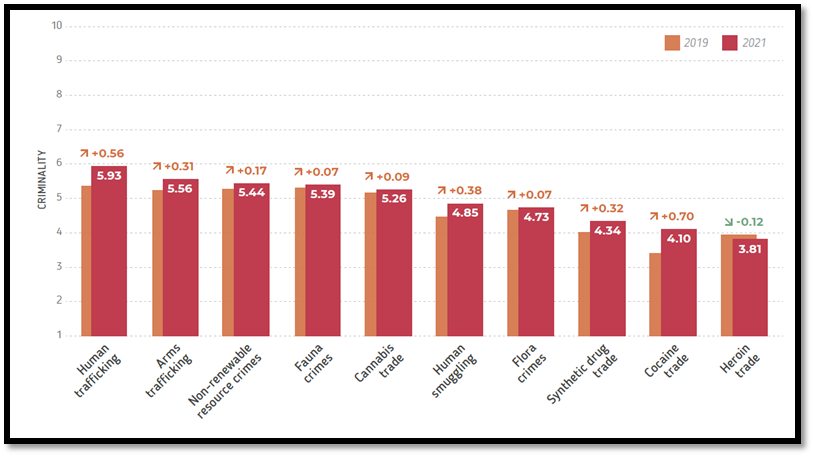
Source ENACT report African Criminal markets 2019–2021
The results above are for Africa overall, not just Southern Africa. In line with global trends, Human trafficking remained the most prolific criminal market in Africa (5.93) The report noted that 30 out of the 54 African countries are assessed as suffering either significant or severe influence from human trafficking. The UNICEF estimates that 160 million children worldwide were engaged in labour in 2020, an increase of 8.4 million from four years previously.
The cocaine trade registered the biggest increase (+0.70) since 2019. The surge in the cocaine market can be largely accounted for by flows in West Africa, which has recently found itself in the spotlight after a number of record-breaking cocaine seizures. Consumption of cocaine is fairly limited throughout Africa, but in recent years West Africa has re-emerged as a key transit hub.
Africa has the second-highest levels of criminality globally
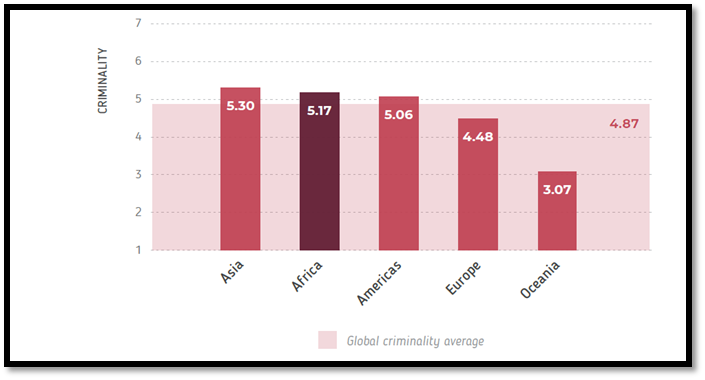
Source ENACT report Criminality by Continent
The ENACT report puts Africa with a score of 5.17 second only to Asia’s score of 5.30. This reflects the high prevalence of criminal markets in Africa and the influence of criminal actors across the continent. Two African countries – the Democratic Republic of Congo (DRC) (7.75) and Nigeria (7.15) are amongst the top five countries globally most affected by organised crime, at first and fifth positions, respectively.
What accounts for these levels of organised criminal activity throughout Africa? The report believes Africa’s
- great abundance of natural resources and well-established trade relations is one reason
- combined with the weak governmental organisations to combat criminal groups and the prevalence of state embedded criminal actors.
- The wide-spread existence of many vulnerable populations, exposing them to higher levels of criminality, forcing many to seek an income in illicit economies, and often becoming targets of organised crime themselves.
Conflict provides a breeding ground in which criminality thrives, and Africa is no exception
Countries that score highest on the criminality component of the Index all experience conflict or some other form of violence, either insurrection, terrorist activity or civil unrest.
Where there are struggling formal economies, displaced persons with increased vulnerability to different forms of exploitation, supplies of illicit weapons: all result in weak government organisations that directly influences criminality levels.
The report finds the two forces impact each other. As conflict creates and sustains criminal markets, illicit economies contribute to and sustain conflict. For example, of the 12 countries scoring at least 8.0 on arms trafficking – a market that thrives in and sustains conflict, all but two scored at least 7.0 for human trafficking as well.
Social protection resilience measures improved, but security-driven responses in Africa remain the norm
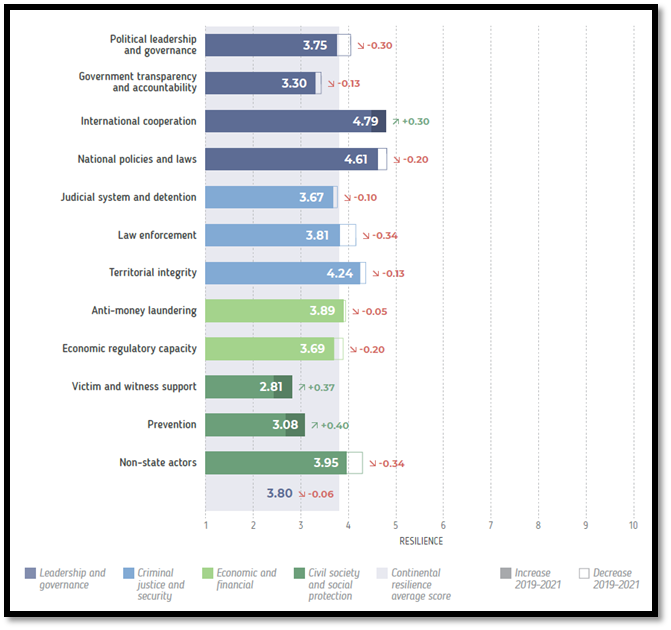
Source ENACT report: Resilience in Africa
In certain countries, such as Cameroon, DRC and Zimbabwe, non-state actors, such as opposition group, NGO’s and community groups remain the last bastion of freedom for many being the most active or sole responders to organised crime, safeguarding against the complete capture of the state by criminal structures.
In many African countries media and civil society operate in hostile environments, although in Zimbabwe not all newspapers are government owned and those independents do a good job in calling out government and non-government crime.
While international cooperation, victim and witness support and crime prevention made positive contributions to resilience from a low base, most other measures showed a worsening situation. The report believed NGO’s are fundamental in advancing anti-organised-crime efforts, keeping authorities in check and promoting tenable organised crime responses through their engagement with communities at a local level.
African regional comparison
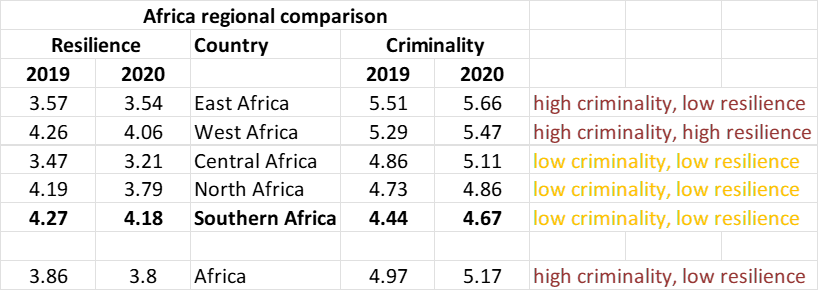
Source ENACT report: Vulnerability classifications map, Africa
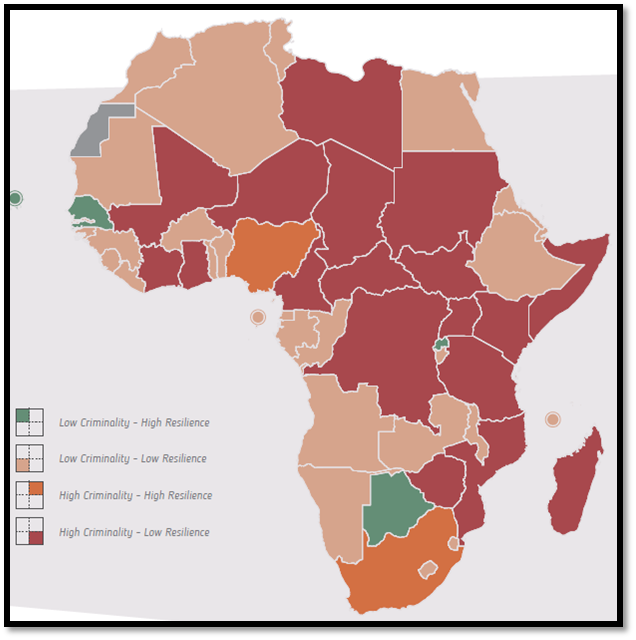
Source ENACT report: Vulnerability classifications map, Africa
The table shows that all regional areas between 2019 – 2020 saw an increase in their criminality scores with Africa’s overall criminality average increasing from 4.97 to 5.17. Central Africa showed the largest (0.26) followed by Southern Africa (0.24) and West Africa (0.19)
The largest increases in criminality scores of individual countries were in Ghana (1.13) Kenya (0.81) Mozambique (0.66) and Equatorial Guinea (0.59)
Some countries experienced an improvement in criminality scores including Somalia (−0.61) Nigeria (−0.55) and Mali (−0.31) although they were from previous high bases and all still have high criminality scores.
Human trafficking remained the main criminal market activity. continentally. There is a continuing growth of cocaine trafficking via West Africa, as well as to expanding consumption markets in countries such as Kenya, Namibia and Lesotho. Other increases were found in the human smuggling, synthetic drugs and arms trafficking markets. Heroin was the only market that declined.
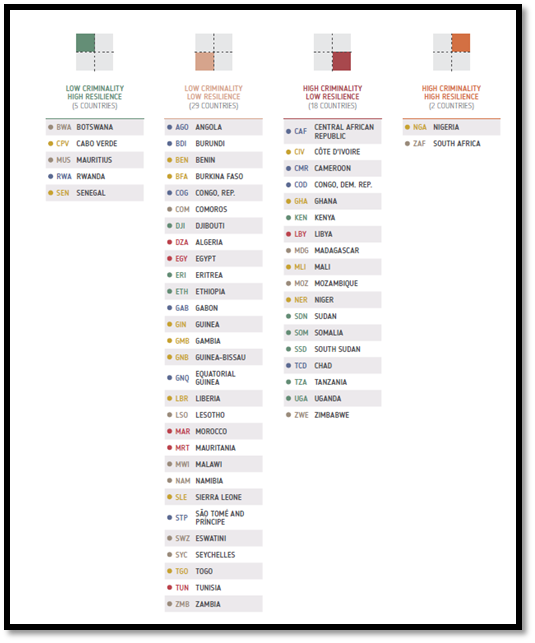
Source ENACT report: Criminality and resilience – country classifications
Focus on Southern Africa
The region scores 4.67 on average – the lowest in Africa, so at first glance criminality in Southern Africa appears moderate, the 2021 Index shows that only four of the 13 countries in Southern Africa have high levels of criminality.
However, what needs to noted is that resilience, although the highest on average across Africa, is low apart from South Africa. More than three-quarters of countries in the region are assessed as having either non-existent/extremely ineffective or moderately effective anti-organised-crime frameworks.
This means they have limited ability to withstand and counter the impact of organised crime groups and state embedded actors within political parties such as ZANU-PF and state organisations.
Criminal markets
There are large natural resource ‘commodities’ available in the Southern African region including
- wildlife (elephants, rhino and pangolins)
- rich fishing grounds off the Indian and Atlantic coasts
- mineral resources including gold, diamonds (think Marange) and coloured gemstones.
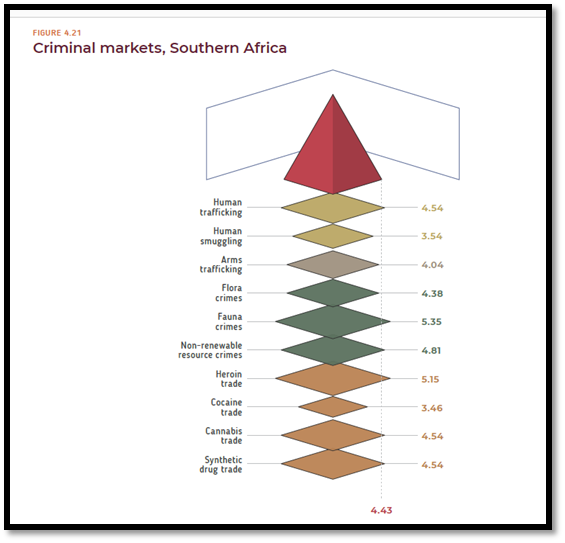
Source ENACT report: Criminal markets, Southern Africa
Thus, it is not surprising that Fauna crimes score highest (5.35) in the ENACT report. Human trafficking (4.54) and human smuggling (3.54) is low compared with the West and North Africa regions, but the report states that where it does occur, it takes the form of sex trafficking, labour exploitation, trafficking of children, that are all rooted in poverty.
Criminal actors
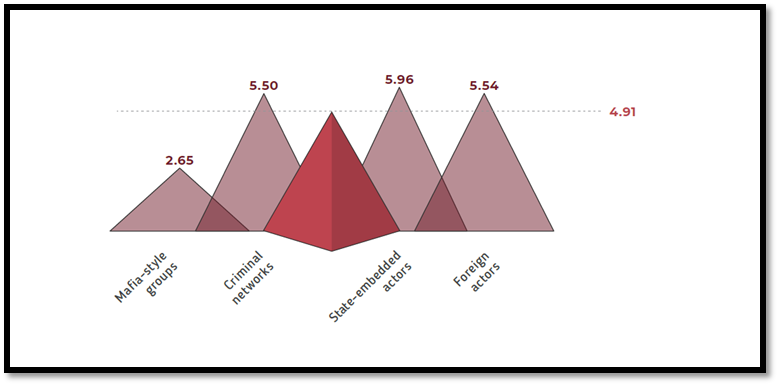
Source ENACT report: Criminal actors, Southern Africa
The ENACT report states that mafia-style groups (2.65) are less common in southern Africa, except in South Africa where heavily armed and violent gangs are particularly active in the drug trade and involved in extortion.
Southern Africa is dominated by state embedded criminal actors dominate the criminal landscape as the above graphic demonstrates. Mozambique (9.00) appears to be the worst country in the region where officials are actively engaged in a great deal of criminal economies – especially the illicit ruby trade – or provide protection to organised crime groups.
In Zimbabwe (8.00) South Africa (7.50) and Madagascar (7.50) elites from the dominant political parties (ZANU-PF, ANC) have abused their powers with impunity and are engaged in every economic activity.
Foreign actors (5.54) particularly Chinese and Nigerians protected by their foreign embassies are also involved in criminal activities, often providing the funding to carry out Fauna crime and the exploitation of mineral resources, particularly diamonds and gold in Zimbabwe.
Resilience
International cooperation’ (5.27) and ‘national policies and laws’ (5.15) are the two highest scoring indicators in Southern Africa with Botswana and Namibia with the highest scores. Comoros, Zimbabwe and Madagascar occupy the lowest rankings.
The ‘national policies and laws’ indicator has most Southern African countries on a moderate scale ranking except for Comoros (2.50) and Zimbabwe (3.00) that are assessed as having low national anti-organised-crime legislative frameworks that are weak in terms of implementation.
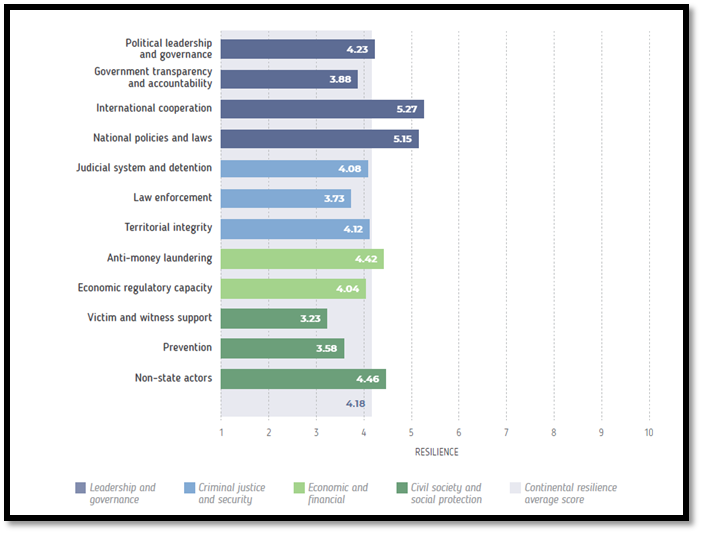
Source ENACT report: Resilience, Southern Africa
‘Political leadership and governance’ and ‘government transparency and accountability’ have low scores of 4.23 and 3.88 demonstrating weak political will to counter organised crime in the region.
Almost half of the countries in Southern Africa have severely limited law enforcement agencies (3.73) that are crippled by flagrant corruption with some police officers also directly involved in criminal economies. A severe lack of resources and professional under capacity, as well as poor treatment of the public give rise to a lack of trust in the police.
In six of the 13 countries there is a low score between 2.00 and 3.00 for effective judicial and detention systems. Botswana, South Africa, the Seychelles and Mauritius are assessed to have independent Judiciaries with some vulnerabilities.
‘Territorial integrity’ (4.12) is still problematic for countries in the region as orders are generally long, difficult to adequately monitor and patrol, especially those with long coastlines.
The anti-money laundering is limited throughout the region scoring just 4.42 and informal economies flourish throughout the region because of poverty and weak regulations.
Two of the indicators making up the civil society and social protection grouping –The report writes that ‘victim and witness support’ (3.23) and ‘prevention’ (3,58) – are very low, feeble, or almost absent.
The Covid-19 lockdowns worsened the economic situation across the region, negatively impacting civil society. Many NGOs in Southern Africa suffered reductions in or loss of funding, severely limiting their scope of operations. Independent media suffered the same way and the ENACT authors believe that national governments in used the pandemic as an excuse to crack down on independent media outlets, further curtailing press freedom.
Focus on Zimbabwe itself
The table below shows that in terms of criminality the ENACT authors believe that Zimbabwe (5.66) is the fourth most corrupt of the thirteen Southern African countries after Kenya (6.95) South Africa (6.63) and Mozambique (6.53)
In its resilience score Zimbabwe (3.17) was second last, only just above the DRC (2.29) of the thirteen Southern African countries.
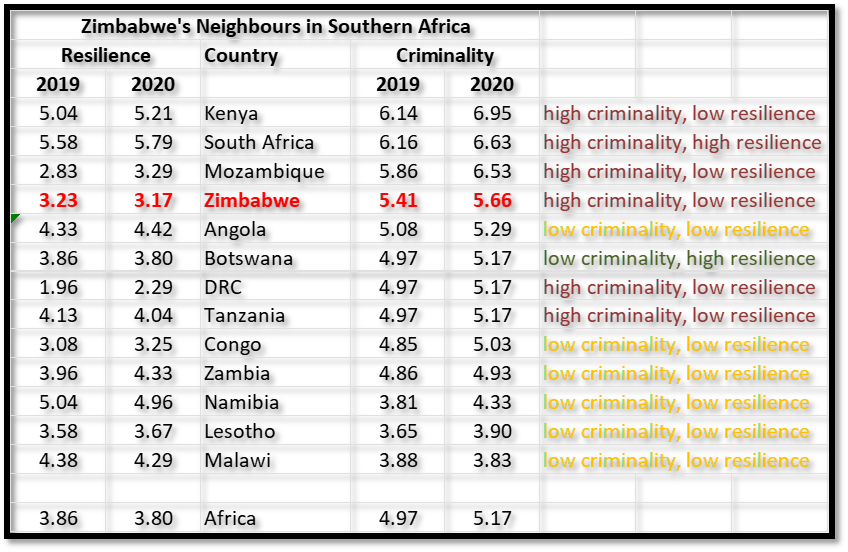
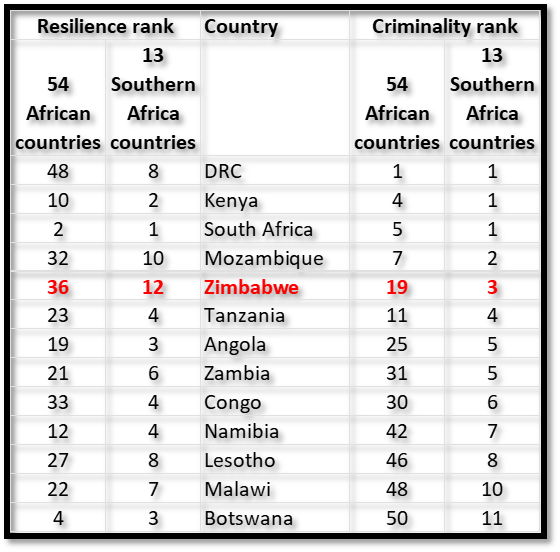
People
The ENACT report reveals that in Zimbabwe sex trafficking and forced labour are the most common forms of exploitation in Zimbabwe. Sex trafficking is particularly common in border towns, while forced labour appears to be significant in agriculture, construction, hospitality and domestic servitude. The decades of steadily deteriorating socio-economic conditions continue to contribute to human trafficking.
Arms trade
There is no evidence of a significant illicit arms market in Zimbabwe, small arms and light weapons (SALW) are trafficked into the country. Zimbabwe Defence Industries (ZDA) is a commercial wing of the Zimbabwe National Army and produces Chinese small arms that have been instrumental in the suppression of the democratic progress in Zimbabwe.
Environment
Illegal logging has increasingly taken place in the country, although probably the need for timber in curing tobacco has resulting in significant deforestation and threatening the existence of endangered indigenous forests. Illegal logging is a main source of income for many in impoverished communities to supply firewood for residents of the main centres as electricity supply has become too erratic or expensive for many families.
The report states there are still significant levels of poaching in Zimbabwe, in particular for ivory and rhino horns, but also including pangolins. While officials insist that poaching has dropped in recent years, the success of state measures is questionable as wildlife trafficking appears to involve state actors. Additionally, Zimbabwe seems to be the epicentre for pangolin poaching despite having one of the strictest laws against pangolin poaching in Africa. Lion parts are destined for foreign markets, being trafficked to Asia, often sold there as tiger parts.
In 2017 Zimbabwe was considered part of the most common ivory trafficking route, running from Harare to Hong Kong through Dubai and this likely continues despite ivory bans in most countries in the Far East, apart from Japan.
More than 400 000 Zimbabweans have turned to illegal gold mining in every auriferous district in Zimbabwe. Basic prospecting and mining is conducted by ‘syndicates’ of desperate, unregistered miners, buying is monopolized by elite bureaucrats who also earn the lion's share of the proceeds, another example of Zimbabwe’s resource looting by a predatory elite – political and military, who enrich themselves to the detriment of the country’s benefit. The diamond industry has been captured by criminal political and military actors.
Drugs
The ENACT report states heroin users include wealthy Zimbabweans who use powder as well as poorer consumers in rural areas who consume nyaope and heavily diluted powder. However the country’s relative poverty precludes it being a very lucrative market for heroin. However Zimbabwe is emerging as a significant inland transit country for heroin, trafficked from Tanzania and Mozambique to West and Southern Africa markets and to European markets. Again information suggests that public figures, as well as political and military officials are all heavily engaged at different stages of the heroin supply chain.
Cocaine use is not significant because of economic poverty, but cannabis is widely produced and consumed in Zimbabwe, and is often exported abroad. The country is also a destination point for cannabis coming from Malawi and Mozambique as well as an established transhipment point that is reportedly controlled by organized crime groups.
Criminal Actors
The ENACT report authors state there is a strong indication since the late 1980s of political and other governmental office holders abusing their respective positions and taking part in activities that are either criminal or illicit. Some of the longest-serving political figures have allegedly long been part of criminal networks. It is thus arguable that the state controls various crime markets in Zimbabwe, in particular trafficking of diamonds and fuel as well as cigarette smuggling and wildlife trafficking.
Criminal networks are also prominent in Zimbabwe. Networks of crime entrepreneurs engage in organized criminal activity often with the help of state-embedded actors, who sanction the use of violence for their economic self-gain. In terms of criminal markets dominated by criminal networks, drug trafficking has increased as such groups groom mules to smuggle hard drugs into the country. Reportedly, a number of crime syndicates of drug lords dominate the markets for illicit drugs in larger cities in the country, such as Bulawayo and Harare as well as in strategic border towns, such as Beitbridge and Mutare.
These syndicates engage the services of high-level officials, but cooperation between those two types of criminal actors is evident across other criminal activities, such as wildlife trade.
The vast majority of foreign actors in Zimbabwe operate in the extractive industries, but there are such who engage in other criminal markets – human trafficking and the drug trade, for example. South African nationals account for the majority of foreign criminal actors in the country, but the Chinese diaspora is also active, particularly in diamond mining as well as trafficking of human beings.
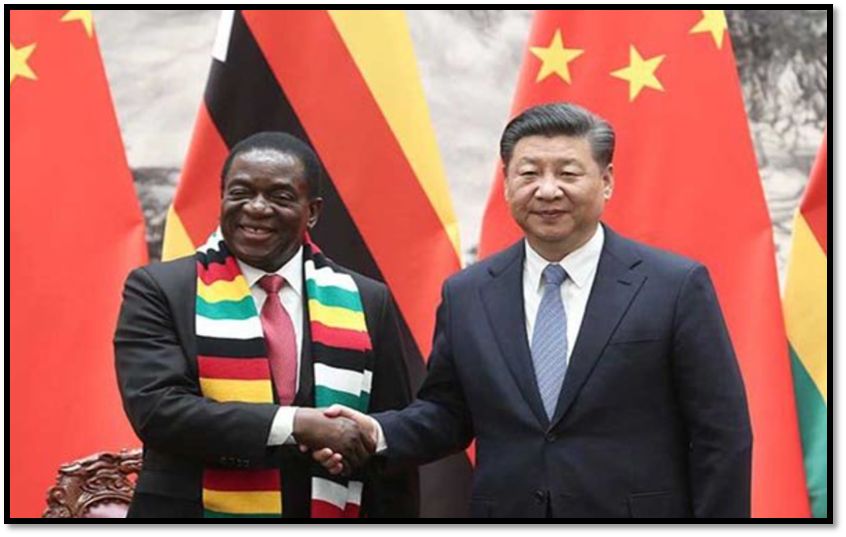
Photo newzimbabwe.com: President Mnangagwa with Chinese counterpart Xi Jinping
China's ties with the Zimbabwean army are reportedly deep and the former has become Zimbabwe's top export market. Not least of all, China continues to be a large destination market for Illegal wildlife products.
There are small, violent gangs who mainly engage in illicit mining activities. Mashurugwi’ machete gangs are involved in violent conflicts in Zimbabwe's artisanal and small-scale gold mining sector.
Leadership and governance
As noted above, there is a high degree of criminalization of the Zimbabwean state and, stemming from that, a high level of state control of criminal markets in the country, coupled with a poor anti-organized crime platform.
The authors state that President Mnangagwa has been vocal in aiming to secure greater legitimacy at home and abroad by taking a hard line on corruption and government involvement in criminal activities, but it is doubtful whether his administration will tackle these issues, as indicated by the 2018 scandal involving the vice-president's wife.
Certain legislative reforms were introduced in 2019, but although oversight mechanisms are in place, they are often described as compromised. Zimbabwe is party to a number of conventions pertaining to organized crime, but the legislative framework on organized crime in Zimbabwe is weakly developed and does not meet international standards.
Criminal justice and security
In the contested political environment in Zimbabwe, the criminal justice system has been a forum for conflict between human rights and the exercise of governmental authority. Trust in the judiciary is low, with strong evidence suggesting that political pressures and corruption are rife. Despite overwhelming evidence of organized criminal activity, convictions are rarely secured.
Dissenting political voices are silenced via ‘legal’ means, including charges of attempting to overthrow a constitutional government and inciting public violence. People are then held in jails for weeks, if not months, awaiting trial.
Law enforcement officers are underfunded and poorly trained, which establishes the prerequisite for corruption in the sector. There are no police units specialized in countering organized crime. Politicized recruitment, training and promotion practices have upheld the status quo. Alongside this, the absence of mechanisms for retrospectively holding police officers to account for alleged abuse has led police to operate with a heavy hand when it comes to protecting the regime.
Economic and financial environment
Money laundering and terrorist financing is among the highest in the world. Although there is a financial intelligence unit as well as a unit dedicated to the recovery of criminal proceeds, there is, however, limited information on the practical implementation of coordination and cooperation measures against money laundering.
Also the executive's control over resources and selection of leadership compromises their effectiveness and credibility. The country’s business climate is also criticized and necessitates the implementation of significant structural and fiscal reforms. In addition, patronage and corruption have led to a chaotic state of management of public finances, which has further eroded trust in the state and in key regulatory institutions.
Civil society and social protection
Zimbabwe offers little in terms of treatment and victim support, which is instead left to civil society and foreign governments. There is also no evidence of functioning and comprehensive witness protection programmes either.
There is no single programme in Zimbabwe to provide support to substance abusers. Instead, scattered organizations provide assistance to communities with health education, support for quitting and treatment.
Zimbabwe’s vibrant civil-society organization (CSO) sector is increasingly under pressure from authorities. As socio-economic conditions in the country have deteriorated, state institutions have actively sought to restrict the space in which civil society operates.
Independent media are also under pressure from the state. Although there is improved access to information and less censorship, journalists are still subject to harassment and intimidation with regular arrests and abductions.
Reference
Africa Organised Crime Index 2021: Evolution of Crime in a Covid World. A comparative analysis of organised crime in Africa, 2019–2021. Prepared by Institute for Security Studies, Interpol, Global Initiative against Transnational Organised Crime and funder by the European Union. https://africa.ocindex.net/
Cartoon is from newzimbabwe.com
